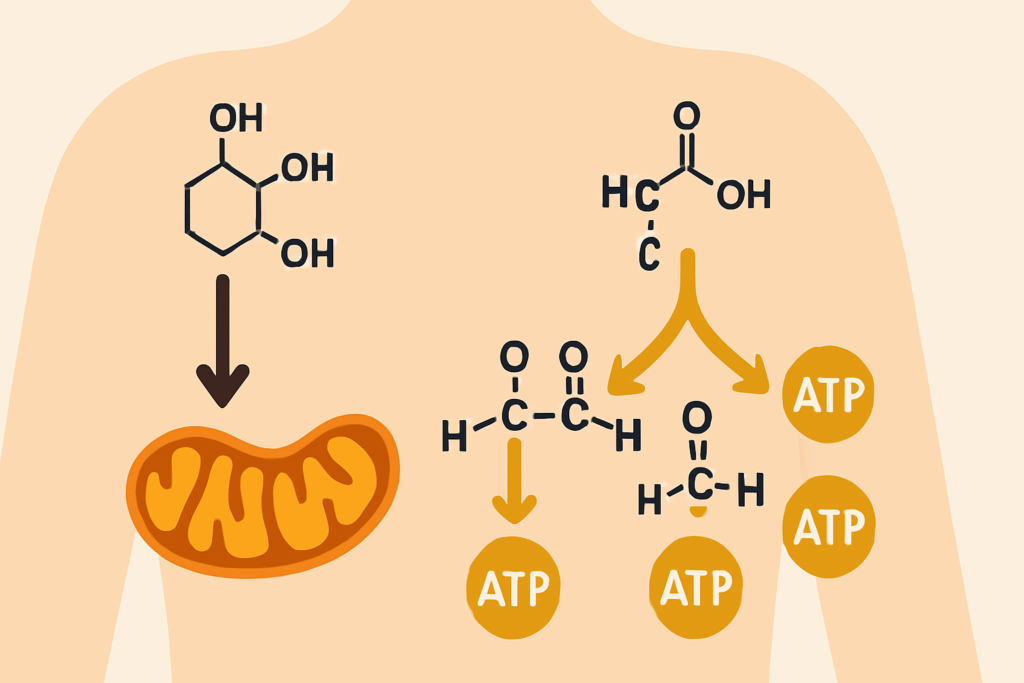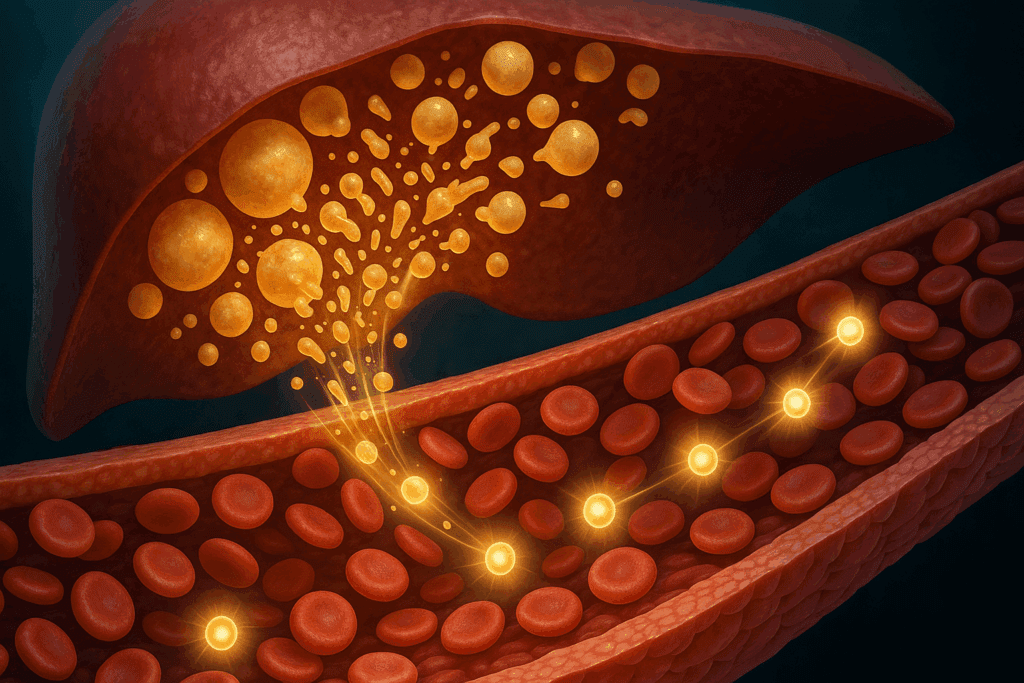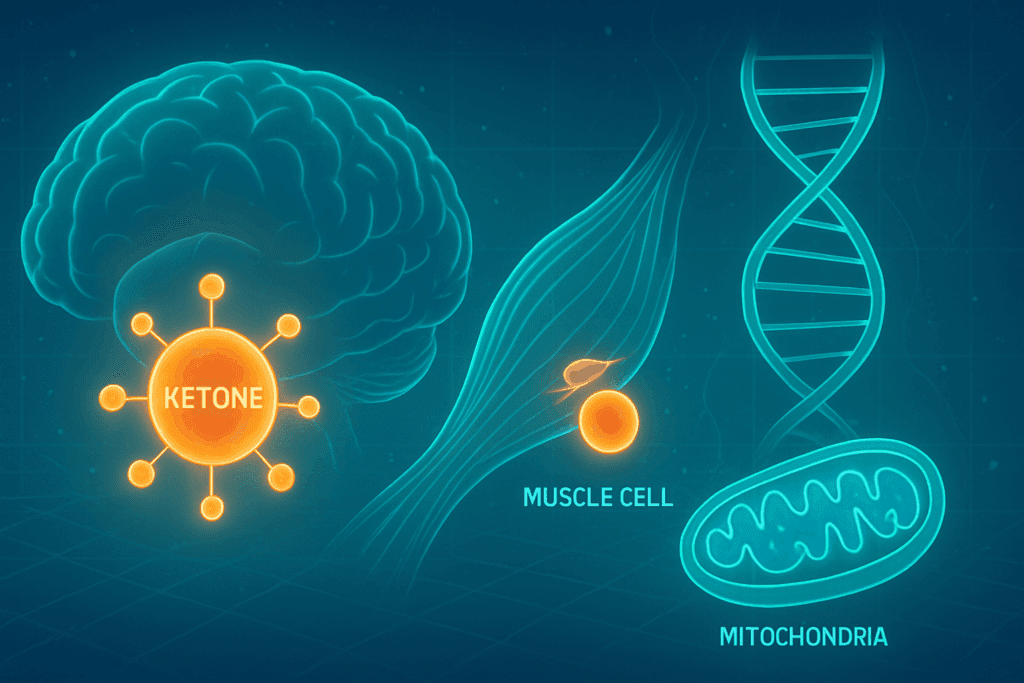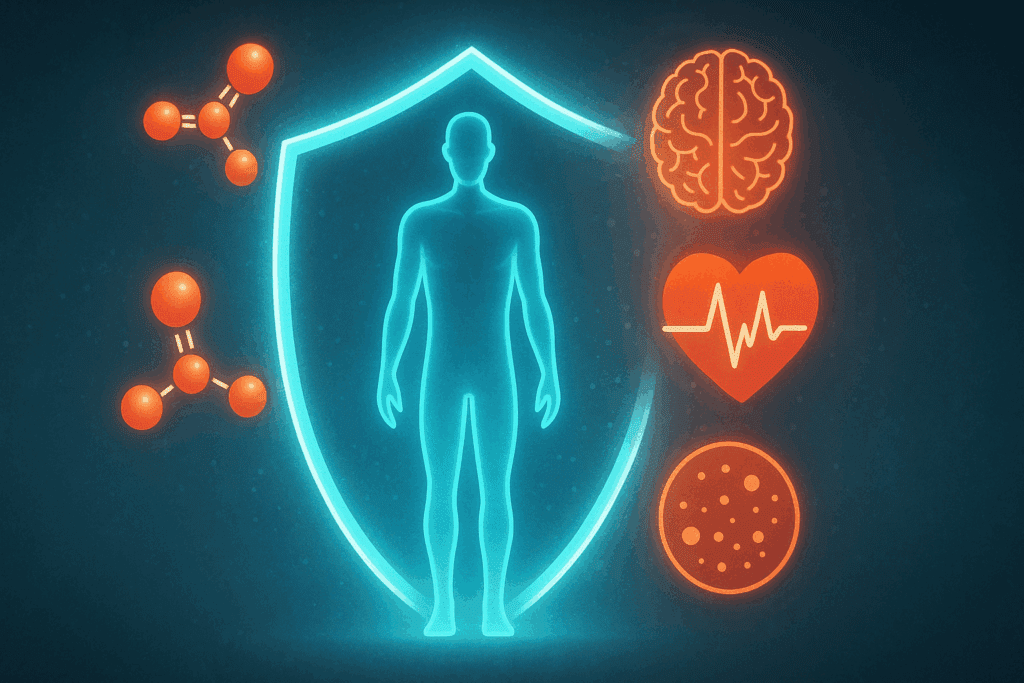Introduction: The Emerging Importance of Ketones in Modern Metabolism
In today’s era of personalized nutrition, metabolic optimization, and disease prevention, ketones have captured the interest of scientists, clinicians, and health-conscious individuals alike. Once considered a byproduct of starvation, ketones are now recognized as essential components of a highly adaptive energy system that the body relies on during times of low carbohydrate availability. This shift in perspective invites a deeper exploration into how do ketones work in the body and why their purpose extends far beyond being a mere alternative fuel. Understanding how fat is broken down to ketone, and what do ketones do across physiological systems, opens a window into metabolic resilience, brain health, and even disease prevention strategies that align with our evolutionary blueprint.
You may also like: Is the Keto Diet Safe or Dangerous? What Experts Say About the Risks, Benefits, and Basics of the Ketogenic Diet

The Basics of Energy Metabolism: Glucose, Fat, and the Role of Ketones
Under normal dietary conditions, the body primarily relies on glucose, a simple sugar derived from carbohydrates, as its main source of energy. Glucose is rapidly metabolized to produce ATP, the energy currency of the cell, through glycolysis and the citric acid cycle. However, this reliance on carbohydrates shifts dramatically when glucose becomes scarce, such as during fasting, prolonged exercise, or a ketogenic diet. In these situations, the body initiates a process known as ketogenesis, which allows fat to be broken down to ketone bodies in the liver.
This metabolic flexibility is a critical survival mechanism, allowing the body to function efficiently even in the absence of food. Ketones—specifically beta-hydroxybutyrate, acetoacetate, and acetone—are produced from fatty acids and serve as alternative fuel sources for many tissues, particularly the brain. As we explore the ketone in body purpose, it becomes evident that ketones are not only an energy substitute but also key metabolic regulators with far-reaching effects.

How Fat Is Broken Down to Ketone: A Look at Ketogenesis
When the body detects a drop in blood glucose and insulin levels, it signals the release of stored fat from adipose tissue. These fatty acids travel to the liver, where they are broken down via a process known as beta-oxidation. The resulting molecule, acetyl-CoA, typically enters the citric acid cycle. However, when glucose is scarce, the cycle slows, and excess acetyl-CoA is redirected into the ketogenesis pathway.
In the liver’s mitochondria, acetyl-CoA is converted into ketone bodies. This is the key biochemical process through which fat is broken down to ketone, making energy accessible during times when glucose cannot meet the body’s demands. The ketones produced are then released into the bloodstream and utilized by the heart, muscles, kidneys, and brain. This efficient system enables the body to maintain performance and cognitive function even during extended periods of fasting or low carbohydrate intake.

What Do Ketones Do? More Than Just an Energy Source
The most immediate role of ketones is to serve as an alternative energy source. During ketosis, the brain—which normally requires a constant supply of glucose—can derive up to 70% of its energy needs from ketones. This adaptation is not just a fallback mechanism but a strategically efficient one. Ketones are known to produce more ATP per molecule of oxygen consumed compared to glucose, making them an energy-dense fuel under certain conditions.
However, asking what do ketones do invites a much broader discussion. Beyond fueling cells, ketones act as signaling molecules that influence gene expression, inflammation, and oxidative stress. For instance, beta-hydroxybutyrate has been found to inhibit histone deacetylases (HDACs), leading to changes in gene activity that may promote longevity, stress resistance, and reduced inflammation. This molecular action suggests that ketones have far-reaching roles in regulating cellular health, not merely in sustaining energy.
Ketone in Body Purpose: A Multifaceted Metabolic Role
The deeper one explores the ketone in body purpose, the clearer it becomes that ketones are integral to metabolic regulation. One key advantage of ketones is their insulin-independent nature. Unlike glucose, ketones do not require insulin for cellular uptake, making them especially beneficial for individuals with insulin resistance or type 2 diabetes. This characteristic helps to stabilize blood sugar levels, prevent energy crashes, and promote metabolic balance.
Furthermore, ketones have been associated with neuroprotective effects. In neurodegenerative diseases like Alzheimer’s and Parkinson’s, where glucose metabolism in the brain is impaired, ketones provide an alternate fuel that can support cognitive function. Preliminary studies suggest that ketogenic diets and ketone supplementation may enhance memory, reduce neuroinflammation, and protect neurons from oxidative damage. These benefits reinforce the evolving view that ketones play a foundational role in both preventive and therapeutic health strategies.

How Do Ketones Work to Improve Athletic Performance and Endurance?
Athletes and biohackers have increasingly turned to ketogenic diets to enhance performance, and the reasons are grounded in biochemistry. During sustained physical exertion, glucose stores (glycogen) can quickly become depleted. By training the body to rely on ketones, athletes may preserve glycogen, reduce lactic acid buildup, and maintain more consistent energy levels.
Understanding how do ketones work in this context involves recognizing their superior energy yield. Because ketones generate more ATP per unit of oxygen than glucose, they may improve endurance under aerobic conditions. Additionally, ketones may help athletes stay mentally focused during prolonged exertion, as the brain thrives on this stable, efficient fuel source. While individual results vary, the metabolic advantages of using ketones for performance enhancement continue to attract attention from elite competitors and weekend warriors alike.
Personalized Ketogenesis: Why Some Bodies Make Ketones Better Than Others
Not everyone responds to ketogenic strategies in the same way. Factors such as genetic predisposition, hormonal health, physical activity levels, and even gut microbiota can influence how efficiently fat is broken down to ketone. Some people may enter ketosis rapidly and remain there with ease, while others struggle to reach and maintain elevated ketone levels even with strict carbohydrate restriction.
Macronutrient composition also plays a role. Medium-chain triglycerides (MCTs), for example, are rapidly absorbed and converted to ketones, providing a helpful tool for those seeking quicker results. Other lifestyle factors, such as stress and sleep quality, also affect ketogenesis. Cortisol, a stress hormone, can inhibit ketone production by disrupting insulin and glucose metabolism. These individualized responses highlight the need for personalized approaches to ketogenic nutrition and underscore the complexity of the ketone in body purpose across diverse populations.

Ketones and Chronic Disease Prevention: A Promising Frontier
One of the most exciting areas of research involves the potential of ketones to prevent or manage chronic diseases. In metabolic disorders like type 2 diabetes, ketones may improve insulin sensitivity, reduce inflammation, and help regulate body weight. In cardiovascular health, they may influence lipid profiles by reducing triglycerides and increasing HDL cholesterol levels.
Additionally, researchers are investigating the impact of ketones in oncology. Certain cancer cells thrive on glucose and struggle to metabolize ketones. This observation has led to studies exploring ketogenic diets as an adjunct therapy for slowing tumor growth, particularly in cancers with mitochondrial dysfunction. While the science is still emerging, understanding what do ketones do in disease contexts could redefine nutritional strategies for prevention and treatment in years to come.
Exogenous Ketones: Shortcuts to Ketosis or Complementary Tools?
With the rising popularity of ketogenic diets, exogenous ketones have entered the wellness market, promising to deliver the benefits of ketosis without carbohydrate restriction. These supplements—available in the form of ketone salts and esters—introduce ketone bodies directly into the bloodstream. While they may elevate blood ketone levels temporarily, they do not activate the full suite of metabolic adaptations that come with endogenous ketosis, such as fat adaptation and insulin modulation.
Understanding how do ketones work with supplementation requires nuance. Exogenous ketones may have utility in clinical settings, such as for cognitive support or rapid energy during athletic performance. However, they should not be viewed as replacements for dietary strategies, which induce more comprehensive physiological changes. Instead, they may serve as tools to support ketosis or provide metabolic support during periods of stress or increased energy demand.
Ketones and Appetite Regulation: Why Ketogenic Diets May Support Weight Loss
One reason ketogenic diets have become synonymous with weight loss is due to the appetite-regulating effects of ketones. When fat is broken down to ketone, the body experiences a more consistent energy supply, reducing hunger pangs and cravings associated with fluctuating blood sugar levels. Beta-hydroxybutyrate, in particular, appears to suppress ghrelin—the so-called “hunger hormone”—and modulate other neuropeptides that influence satiety.
Moreover, individuals in ketosis often report increased feelings of fullness and reduced interest in food, which can naturally lead to decreased caloric intake without deliberate restriction. This effect, combined with improved insulin sensitivity and fat oxidation, contributes to the effectiveness of ketogenic diets in promoting fat loss, particularly around the abdomen. These mechanisms further illustrate the powerful influence of ketone metabolism on behavior, physiology, and health outcomes.

The Evolutionary Origins of Ketones: Designed for Survival
From an evolutionary perspective, the ability to produce and use ketones is a remarkable adaptation that helped our ancestors survive periods of food scarcity. Before the advent of agriculture, humans frequently went days without eating, and ketogenesis ensured that the brain and body could continue to function even when dietary carbohydrates were unavailable. This metabolic flexibility remains hardwired into our biology, despite our modern tendency to consume carbohydrate-rich diets.
Recognizing the ketone in body purpose as a built-in survival mechanism reframes it not as an unnatural state, but as a deeply ingrained feature of human physiology. Today, by mimicking ancestral dietary patterns through intermittent fasting or low-carb eating, we can leverage this ancient system to enhance energy, cognition, and disease resistance in the modern world.
Frequently Asked Questions (FAQ): Understanding How Ketones Work in the Body
1. Can stress or emotional states influence how ketones function in the body?
Absolutely. Chronic stress has a profound effect on metabolic flexibility, which includes the ability to produce and utilize ketones efficiently. High cortisol levels can suppress the hormonal signals that trigger the metabolic switch from glucose to fat metabolism, thereby interfering with the process by which fat is broken down to ketone. Moreover, stress-induced insulin resistance may dampen the responsiveness of cells to ketones as a fuel source. While short-term stress may temporarily raise blood sugar and reduce ketogenesis, prolonged stress could completely derail the ketone in body purpose by prioritizing glucose availability through gluconeogenesis. Managing stress through mindfulness practices, quality sleep, and physical activity is crucial for those seeking the full benefit of ketosis.
2. Do ketones affect your gut health and digestion?
Yes, recent research indicates that ketones can influence gut microbiota composition and gastrointestinal health. The question of what do ketones do extends beyond energy to include their impact on microbial balance. Some studies suggest that ketogenic diets may foster a gut environment that supports anti-inflammatory bacteria while reducing populations of potentially harmful species. This modulation may help reduce symptoms of IBS or leaky gut syndrome, especially when combined with whole foods. Additionally, beta-hydroxybutyrate may have direct anti-inflammatory effects on intestinal lining cells, further reinforcing the multifaceted ketone in body purpose.
3. How does intermittent fasting enhance ketone production compared to a standard ketogenic diet?
Intermittent fasting rapidly accelerates the metabolic shift that leads to fat being broken down to ketone bodies. Unlike continuous ketogenic dieting, fasting forces the body to exhaust its glycogen stores more quickly, prompting an earlier rise in ketone levels. This method may result in a faster mental clarity response, improved autophagy, and better blood sugar regulation. Additionally, fasting seems to prime the body to respond more robustly when carbohydrates are reintroduced, maintaining metabolic flexibility. This shows that understanding how do ketones work requires not only dietary changes but also timing and hormonal cycles that influence ketogenesis.
4. Are there specific fitness benefits from using ketones during strength training?
Though ketones are more often discussed in the context of endurance sports, they also play a valuable role in strength training by providing stable energy without the insulin fluctuations associated with carbohydrate metabolism. During resistance training, ketones help maintain ATP levels while supporting mitochondrial function. Additionally, because ketones reduce oxidative stress, they may promote faster recovery and muscle preservation. This application reveals another layer in the understanding of what do ketones do—they act as anti-catabolic agents that help preserve muscle tissue during caloric deficit or fasting periods. For athletes concerned about fat being broken down to ketone and potential muscle loss, this insight is especially reassuring.
5. Can the body adapt over time to use ketones more efficiently?
Yes, metabolic adaptation is a key concept in understanding how do ketones work long-term. As the body becomes accustomed to utilizing ketones, mitochondrial density increases, and enzymes responsible for ketone uptake become more active. This results in quicker transition times between energy sources, improved endurance, and reduced side effects like the “keto flu.” It also enhances the ability of fat to be broken down to ketone with fewer dietary restrictions. The ketone in body purpose becomes more refined with experience, illustrating how regular exposure to ketosis builds a more capable and responsive metabolic system.
6. What are the potential long-term risks of relying heavily on ketones?
While ketones offer numerous metabolic benefits, over-reliance without proper nutritional planning may carry risks. Extended periods of carbohydrate restriction can lead to micronutrient deficiencies, altered thyroid function, and gastrointestinal issues if not properly managed. The body’s ability to break down fat to ketone is powerful but should be supported by nutrient-dense foods, hydration, and electrolyte balance. Also, in rare cases, individuals may develop physiological insulin resistance—a protective adaptation that can confound glucose tolerance tests. A balanced understanding of what do ketones do requires recognizing both their strengths and limitations in the context of holistic nutrition.
7. How do exogenous ketones fit into the bigger picture of natural fat metabolism?
Exogenous ketones, such as ketone esters or salts, provide a shortcut to elevated blood ketone levels without requiring fat to be broken down to ketone naturally. While this may provide a temporary energy boost or cognitive lift, it bypasses the hormonal and enzymatic shifts that occur during endogenous ketosis. This means that while helpful in specific situations—such as rapid recovery or mental fatigue—exogenous ketones do not fulfill the full ketone in body purpose. They offer an incomplete snapshot of what do ketones do when generated internally, particularly since they do not increase fat oxidation or improve insulin sensitivity on their own. Therefore, they should complement, not replace, metabolic interventions like fasting or low-carb nutrition.
8. Can ketone metabolism be beneficial for cognitive or mental health disorders?
Emerging evidence suggests that ketones may offer therapeutic benefits for conditions like depression, anxiety, and ADHD. Their ability to stabilize neuronal energy and reduce inflammation in the brain opens new avenues for nutritional psychiatry. The ketone in body purpose, when viewed through the lens of cognitive performance, becomes much more than just fueling the brain—it encompasses mood regulation, neuroplasticity, and neurotransmitter balance. Fat broken down to ketone may reduce excitotoxicity in the brain and enhance GABA production, which has calming effects on the nervous system. As mental health research integrates metabolic therapies, ketones are gaining traction as adjunctive tools.
9. What’s the role of ketones in healthy aging and longevity?
Ketones influence many of the same cellular pathways activated by caloric restriction, a known strategy for extending lifespan. Beta-hydroxybutyrate, in particular, triggers anti-aging mechanisms by inhibiting histone deacetylases, reducing inflammation, and improving mitochondrial function. As we better understand what do ketones do at the epigenetic level, their role in healthy aging becomes clearer. Fat broken down to ketone not only sustains energy but also protects against age-related decline by promoting autophagy and lowering oxidative stress. In longevity science, ketones are increasingly being explored as metabolic signals that promote cellular repair and delay senescence.
10. How can someone safely test and track their ketone levels for better results?
Monitoring ketone levels through breath, blood, or urine tests can offer personalized feedback on metabolic efficiency. Blood ketone meters provide the most accurate readings of beta-hydroxybutyrate, especially when tracking how fat is broken down to ketone over time. However, numbers alone don’t tell the full story. It’s important to correlate ketone readings with physical performance, mental clarity, and metabolic markers such as fasting glucose and triglycerides. Understanding how do ketones work is enhanced when testing is used not just for confirmation, but for optimizing timing, nutrient intake, and lifestyle choices to better support the full ketone in body purpose.
Conclusion: Why Understanding Ketones Matters for Modern Health and Longevity
Understanding how ketones work in the body is more than an academic exercise—it’s a gateway to optimizing health, enhancing performance, and potentially preventing chronic disease. Ketones serve not only as a backup fuel when carbohydrates are scarce but as active agents that regulate inflammation, protect neurons, stabilize metabolism, and modulate gene expression. This multifaceted role underscores the deeper ketone in body purpose and validates the growing interest in ketogenic nutrition as a science-backed wellness strategy.
As we continue to uncover what do ketones do across various systems, it becomes clear that their influence extends from mitochondrial health to hormonal balance and even longevity. The process by which fat is broken down to ketone is not just efficient but evolutionarily elegant, supporting human resilience under a wide range of physiological conditions. For those seeking to harness the benefits of nutritional ketosis—whether for weight loss, cognitive clarity, athletic performance, or disease prevention—learning to understand and respect this metabolic pathway is key.
In an age where chronic diseases are driven by poor metabolic health, ketones offer a naturally derived, scientifically supported solution that works in harmony with the body’s design. As research continues to evolve, the promise of ketones will likely grow, and with it, our ability to live longer, think clearer, and feel better through smarter, evidence-based nutrition.
Further Reading:
What to know about exogenous ketones
Ketone bodies: from enemy to friend and guardian angel


